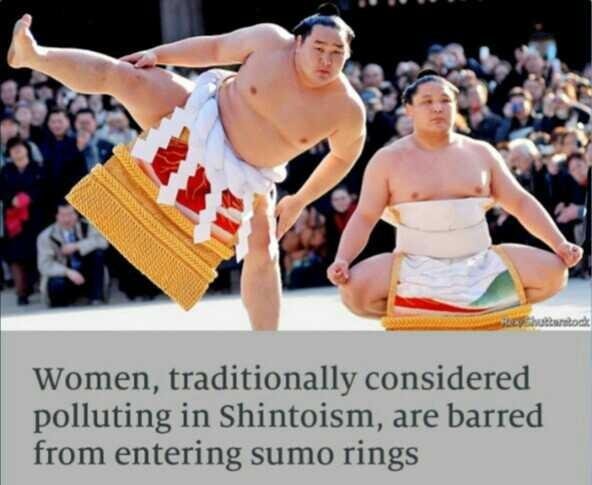A sacred sport outrages feminists, and nearly everyone else

THERE is more to sumo than fat men grunting. The sport also has a religious dimension: each match is preceded by intricate Shinto rituals. The ring is said to be sacred ground. Women, traditionally considered polluting in Shintoism, are barred from entering it. But many Japanese were nonetheless shocked when the referee at a match earlier this month ordered out of the ring several women who had rushed to give first aid to the local mayor, who had collapsed while giving a speech.
The sumo association later apologised for the referee’s “inappropriate response in the life-threatening situation”, but appeared to stand by the rule. Two days later a female mayor criticised the sport’s sexism in a speech at a sumo tournament, which she had to make from the sidelines of the ring. National politicians have also weighed in.
“Before the incident no one really cared about the restrictive nature of the rule,” says Nagisa Osada, a sports writer, “but it revealed that sumo officials saw the gender rule as more important than the mayor’s life.” Some have pointed out that sumo has not always been so pious. It was only in the militarist 1930s that the sport became a symbol of national pride and religious purity. In previous eras, women were allowed to fight, sometimes topless. A 5th-century emperor staged just such a bout to distract a carpenter who had boasted that he never made mistakes. The carpenter botched his work, and was executed.
The current fuss may not spur change. Many religions discriminate against women, and the rule does not stand out as much in Japan, a country not known for equality of the sexes, as it might elsewhere. In any case, says Ms Osada, women face more important battles.
But the sumo association has reason to be mindful of women’s feelings. The sport had been suffering from declining audiences and a series of embarrassing scandals, including a top-ranking fighter’s assault on a more junior wrestler last year. But it has recently been enjoying a resurgence in popularity thanks to “sujo”—young female fans.
source: http://horizonasia.net/why-women-are-not-allowed-in-sumo-rings-even-to-save-a-life/
Hi! I am a robot. I just upvoted you! I found similar content that readers might be interested in:
http://horizonasia.net/why-women-are-not-allowed-in-sumo-rings-even-to-save-a-life/
Downvoting a post can decrease pending rewards and make it less visible. Common reasons:
Submit